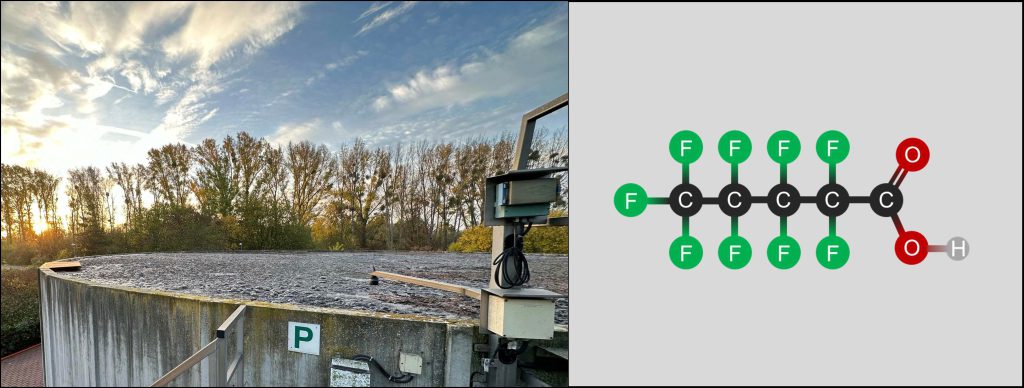Thermo-chemical destruction of PFAS from sludge
Improvement of thermo-chemical destruction processes of Perfluoroalkyl and Polyfluoroalkyl Substances (PFAS) removal from sewage sludge
PFAS compounds, known for their strong carbon-fluorine bonds, resist degradation and often contaminate municipal wastewater due to widespread utilization at industrial and consumers level. Treatment plants play a key role in managing PFAS in such wastewater influents, as longer-chain compounds (C6 and above) tend to accumulate in the resulting sewage sludge. The treatment of sewage sludge in the Netherlands includes anaerobic digestion for biogas and phosphate recovery, followed by incineration at 850–950°C. However, PFAS stability makes thermal degradation challenging, with incomplete breakdown of their chemical structure, posing emission risks. PFAS starts degrading at ~350°C, forming stable fluorinated by-products, while complete destruction may require temperatures above 1100°C, producing the poisonous gas hydrogen fluoride (HF), which must be removed. However, the characteristics of the emissions and by-products from incineration, pyrolysis, and gasification remain poorly understood, highlighting the need for further research into their environmental impact to assess the effectiveness of such destruction approaches.
Research challenges
A potential improvement to current incineration practices for PFAS removal is to create oxygen-limited conditions in the furnace or creating high temperature within the combustion process. Under these conditions, radical donors (e.g., hydrocarbon fuels or water) enable •H radicals to scavenge fluorine radicals, helping to prevent the formation of harmful fluorinated by-products. This oxygen-limited setup, similar to pyrolysis and gasification, could be achieved in fluidized bed incinerators by adjusting the type of fluidizing gas, air inlet position, and residence time. Understanding and optimizing these processes requires detailed mass balance evaluation and precise measurements across different phases. This is crucial for accurately tracking PFAS volatilization and decomposition reactions, which begin below 450 °C and include hydrodefluorination, where carbon-fluorine bonds are converted to carbon-hydrogen bonds. Detection and quantification of target components at low concentrations are essential, such as the released fluoride, and ideally, also the intermediate fluoro-organic compounds. Developing reliable measurements will support and guide process adjustments, enabling more effective PFAS breakdown.
Your assignment
In this PhD project, you will evaluate the effectiveness thermal treatments applied, e.g., incineration, pyrolysis, and gasification, in removing PFAS, their precursors, and persistent by-products from sewage sludge. Your research will focus on optimizing the pyrolytic (reductive) zone to enhance PFAS destruction at lower temperatures. Key tasks include developing measurement techniques to determine the PFAS mass balance across different phases (water, solid and liquid), conducting field sampling at real treatment facilities, and analysing collected data to assess the degradation efficiency. You will also investigate critical operational parameters, design and perform controlled laboratory-scale simulations, and explore process optimization strategies, (i.e. the feasibility of an alkali scrubber to convert HF emissions into fluoride salts for safer disposal).
Your profile
You hold a MSc degree in chemical engineering, process engineering, environmental engineering, or a related field. You are an independent and motivated researcher with a strong interest in multidisciplinary work and a willingness to explore topics beyond your current expertise. Prior knowledge on PFAS and/or sludge treatment is an advantage. You thrive in a dynamic environment and enjoy solving challenges as they arise. A driver’s license valid also in the Netherlands is a plus.
Keywords: incineration; gasification; pyrolysis; thermal destruction; sewage sludge.
Professor/University group/Wetsus supervisor(s):
University promotor and co-promotor: Prof. Dr. Ir. SRA (Sacha) Kersten and Dr. Ir. AGJ (Louis) van der Ham (Twente University, Faculty of Science and Technology, Sustainable Process Technology)
Wetsus Supervisor(s): Dr. Amanda Larasati (Theme coordinator Integrated PFAS treatment, daily supervisor), Ir. Wokke Wijdeveld, MSc (Scientific Project Manager, scientific advisor)
Project partners: Integrated PFAS treatment theme
Only applications that are complete, in English, and submitted via the application webpage before the deadline will be considered eligible.
Guidelines for applicants: https://phdpositionswetsus.eu/guide-for-applicants/
